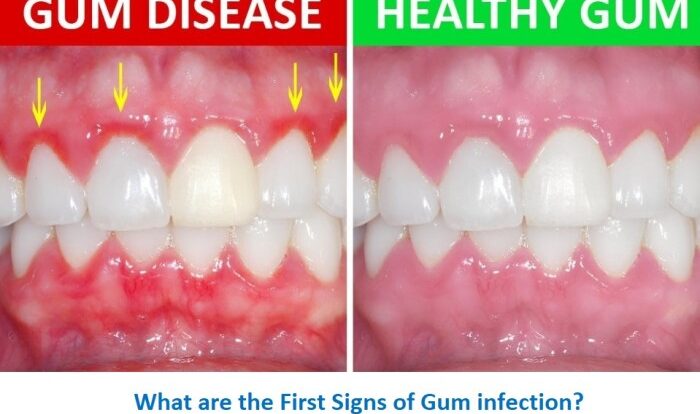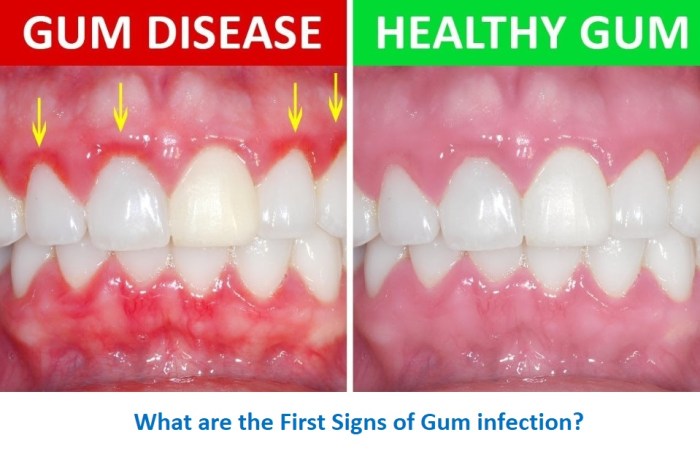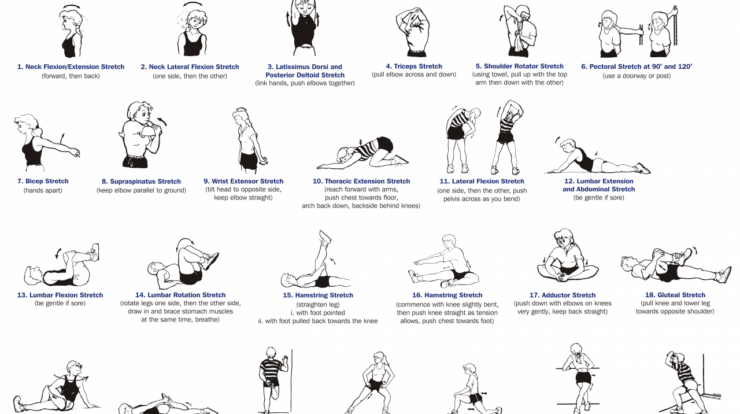
How to cure gum disease without a dentist – Gum disease, a common dental problem, can be effectively managed without a dentist’s intervention. This guide delves into natural remedies and lifestyle adjustments that can help you alleviate gum disease symptoms and promote oral health.
From the comfort of your home, discover a range of natural remedies like salt water rinses, tea tree oil, and turmeric, along with their potential benefits and risks. Learn how simple lifestyle changes, such as improving oral hygiene, reducing sugar intake, and quitting smoking, can significantly impact your gum health.
Home Remedies for Gum Disease
Gum disease, a common problem, occurs when bacteria accumulate in the mouth, leading to inflammation and damage to the gums. While professional dental care is crucial for managing gum disease, several natural remedies can help alleviate symptoms and support oral health.
However, it’s essential to note that home remedies should not replace professional dental care. Regular checkups and cleanings are essential for preventing and treating gum disease effectively.
Salt Water Rinses
Salt water rinses are a simple and effective way to reduce inflammation and kill bacteria in the mouth. Saltwater helps draw out excess fluid from the gums, reducing swelling and discomfort.
- Mix half a teaspoon of salt in a glass of warm water.
- Rinse your mouth for 30 seconds, swishing the solution around thoroughly.
- Repeat several times a day, especially after meals.
Tea Tree Oil
Tea tree oil possesses antibacterial and anti-inflammatory properties. It can help reduce gum inflammation and prevent further infection.
- Add a few drops of tea tree oil to a glass of water.
- Swish the solution in your mouth for 30 seconds.
- Do not swallow the solution, as tea tree oil can be toxic if ingested.
Turmeric, How to cure gum disease without a dentist
Turmeric contains curcumin, a compound with potent anti-inflammatory and antibacterial properties. It can help reduce gum inflammation and pain.
- Mix a teaspoon of turmeric powder with a little water to form a paste.
- Apply the paste to the affected gums and leave it on for 10-15 minutes.
- Rinse your mouth thoroughly with warm water.
Lifestyle Changes to Prevent Gum Disease

Adopting a healthy lifestyle can significantly contribute to preventing gum disease. Maintaining good oral hygiene practices, making mindful dietary choices, and avoiding harmful habits like smoking and excessive alcohol consumption are crucial for optimal gum health.
Oral Hygiene Practices
Regular brushing and flossing are essential for maintaining a clean and healthy mouth. Brushing twice a day with a fluoride toothpaste helps remove plaque and bacteria from the teeth and gums. Flossing once a day removes plaque and food particles from between the teeth, where brushing alone cannot reach.
Using an antiseptic mouthwash can further reduce bacteria and freshen breath.
Dietary Choices
Sugary foods and drinks promote the growth of bacteria in the mouth, which can lead to plaque formation and gum disease. Limiting sugar intake by reducing consumption of sugary snacks, drinks, and processed foods is beneficial for gum health. Instead, opt for a balanced diet rich in fruits, vegetables, and whole grains.
Smoking and Alcohol Consumption
Smoking cigarettes and consuming excessive alcohol can harm the gums. Smoking weakens the immune system, making it harder for the body to fight off gum disease. Alcohol can also dry out the mouth, reducing saliva production, which is essential for maintaining a healthy oral environment.
Professional Treatment Options for Gum Disease

Professional treatment options for gum disease vary depending on the severity of the condition. These treatments aim to remove bacteria and tartar from the teeth and gums, and to promote healing. Regular dental check-ups and cleanings are crucial for preventing and treating gum disease.
Scaling and Root Planing
Scaling and root planing is a non-surgical procedure that involves removing plaque and tartar from the teeth and below the gum line. It is typically performed under local anesthesia and may require multiple appointments. Scaling and root planing can help to reduce inflammation and bleeding, and to improve gum health.
Gum Surgery
Gum surgery is a more invasive procedure that may be necessary if scaling and root planing are not effective. There are different types of gum surgery, including flap surgery and bone grafting. Flap surgery involves lifting back the gum tissue to remove bacteria and tartar, and to reshape the bone.
Bone grafting may be necessary to repair damaged bone.
Alternative Therapies for Gum Disease
In addition to conventional treatments, alternative therapies may offer complementary benefits for gum disease. These therapies aim to reduce inflammation, improve circulation, and support overall oral health.
Acupuncture
Acupuncture involves inserting thin needles into specific points on the body to stimulate the nervous system. It is believed to reduce inflammation and improve blood flow to the gums, promoting healing and reducing pain.
Yoga and Meditation
Yoga and meditation practices can help reduce stress and anxiety, which can contribute to gum disease. These practices promote relaxation, improve circulation, and may help regulate the immune system, all of which can support oral health.
Gum disease is a serious condition that can lead to tooth loss and other health problems. If you’re looking for ways to cure gum disease without a dentist, there are a few things you can do. How to cure gum disease without a dentist by following these simple steps: brush your teeth twice a day, floss daily, and use a mouthwash that contains fluoride.
You can also try using natural remedies, such as oil pulling or taking probiotics. If you’re experiencing any symptoms of gum disease, such as bleeding gums or loose teeth, it’s important to see a dentist right away.
Prevention and Early Detection of Gum Disease

Gum disease is a serious infection of the gums that can damage the soft tissue and bone that support your teeth. It’s a major cause of tooth loss in adults, but it can be prevented and treated if it’s caught early.The
You can get gum disease when bacteria infect the gums. To get rid of it, you need to kill the bacteria. There are many ways to do this, but one of the most effective is to use a mouthwash that contains an antibacterial agent.
You can also try using a toothpaste that contains fluoride, which can help to strengthen the teeth and gums. For more information on how to cure gum disease without a dentist, check out this article . It has some great tips on how to keep your gums healthy and prevent gum disease from coming back.
early signs of gum disease include bleeding gums, gum recession, and bad breath. If you notice any of these symptoms, it’s important to see your dentist right away. Early detection and treatment of gum disease can help prevent serious damage to your teeth and gums.
It’s easy to overlook gum disease, but if left untreated, it can lead to serious health issues. Luckily, there are several ways to treat gum disease without a dentist. From practicing good oral hygiene to using natural remedies, there are many options to choose from.
For more information on how to cure gum disease without a dentist, click here .
Self-Screening for Gum Disease
You can self-screen for gum disease by checking for the following signs:
- Bleeding gums when you brush or floss
- Gums that are red, swollen, or tender
- Gums that are receding from your teeth
- Pus between your teeth and gums
- Bad breath that doesn’t go away
- Loose teeth
If you notice any of these signs, it’s important to see your dentist right away. Early detection and treatment of gum disease can help prevent serious damage to your teeth and gums.
If you’re looking for ways to cure gum disease without a dentist, you’re in luck. There are a few simple steps you can take to improve your oral health and get rid of gum disease for good. Check out this guide on how to cure gum disease without a dentist to learn more about the causes of gum disease and how to prevent it in the future.
Final Conclusion

Remember, gum disease prevention and early detection are crucial. Be mindful of signs like bleeding gums, gum recession, and bad breath. By embracing these natural remedies and lifestyle adjustments, you can effectively manage gum disease without a dentist’s visit, maintaining a healthy and radiant smile.
Popular Questions: How To Cure Gum Disease Without A Dentist
Can gum disease be cured permanently?
Gum disease can be managed and controlled, but it cannot be permanently cured. However, with proper care and maintenance, you can prevent its progression and maintain healthy gums.
How long does it take to cure gum disease naturally?
The time frame for improvement varies depending on the severity of gum disease and your body’s response to natural remedies. Some people may experience noticeable results within a few weeks, while others may require several months to see significant changes.
Can I use essential oils to treat gum disease?
Certain essential oils, such as tea tree oil and clove oil, possess antibacterial and anti-inflammatory properties that may benefit gum health. However, it’s crucial to dilute essential oils with a carrier oil like coconut oil before applying them to your gums.





